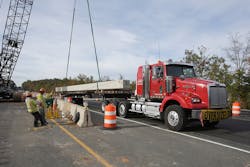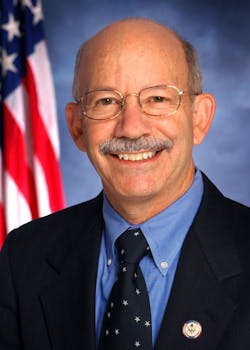DeFazio: Transportation requires a “change of mindset”
Rep. Peter DeFazio (D-OR) believes that, from a policy perspective at least, a long-term surface transportation bill can be crafted by the current Congress. The major roadblock to such a bill, however, remains how to pay for it.
“[Chairman of the House Transportation and Infrastructure Committee] Bill Shuster (R-PA) and I might fight over the share of transit funding in a [six-year] surface bill and we may have other minor policy differences here and there, but we’re pretty much on the same page,” DeFazio explained during a speech during the annual Washington Briefing hosted by the American Association of State Highway and Transportation Officials (AASHTO) this week.
“We can work all of that out,” he stressed. “The problem is we don’t do the financing; that comes of the Ways and Means committee. And we’re hung up on revenues.”
DeFazio noted that efforts to generate more transportation funding without increasing fuel taxes – such as via broader tax reform – are “not realistic” in large part due to the limited time available.
“Can we get tax reform done by May 31st when the [highway] trust fund runs out of money? Even if that could be done – which it can’t – it’s not realistic because the deadlines are much, much quicker for you at the state level,” he explained. “We’ve already had some states postpone or even cancel [highway project] work for this summer because of the uncertainty of federal funding.”
DeFazio also had harsh words for Republican “devolutionists” who in the past wanted to “devolve” transportation funding and policy back to the state level and for President Obama’s administration, especially where the nearly $900 billion American Recovery & Reinvestment Act or “stimulus bill” passed during the early days of the president’s first term is concerned.
“Even in the most optimistic view, just 7% of that bill went towards infrastructure investment, with just 4% [focused] on surface transportation infrastructure,” he noted. “Basically, the Obama people hated infrastructure; they thought it was old school and didn’t want to go there. But the president kept talking about it like we were doing it so the public got skeptical.”DeFazio (seen at right) also described “devolution” of transportation policy “a cockamamie theory” but said the “good news” where “devolution” is concerned is that it’s being abandoned by some of its more ardent champions – notably Sen. James Inhofe (R-OK), who used to work side-by-side with DeFazio on transportation issues in the House before winning election to the Senate.
“The good news is Inhofe [Chairman of the Senate Environment and Public Works Committee] now says devolution doesn’t work, won’t work, and that we need a national [transportation funding] program,” DeFazio stressed. “So now neither chairman [Inhofe and Shuster] supports this [devolution] idea.”
The challenge, however, remains the lack of strategic transportation funding that is making the U.S. increasingly uncompetitive from an economic standpoint.
“How can we compete against countries like India, which spends 6% of its GDP [gross domestic product] on transportation infrastructure, or Brazil, which spends 5%,” DeFazio emphasized.
“How do we compete with countries that are becoming so much more efficient at moving goods and people and in the process of creating such [transportation] systems employ a hell of a lot of people and have a more robust economy?”
As a result, DeFazio said he’s taken to calling the U.S. “a third world country” in terms of infrastructure investment. “We invest about 1% of our GDP in infrastructure; try and find another major industrialized country that puts as little as 1% into infrastructure,” he noted. “In terms of GDP investment we’re competing with Zimbabwe.”
DeFazio wrapped up by noting that “a change of mindset” is needed where transportation funding is concerned: a need to few it as an investment, not an expense.
“[Transportation] has always been bipartisan; it’s about moving people and goods more efficiently in this country … and connecting us to the world,” he explained. “It should be something we can all come together on.”
About the Author
Sean Kilcarr
Editor in Chief
Sean Kilcarr is a former longtime FleetOwner senior editor who wrote for the publication from 2000 to 2018. He served as editor-in-chief from 2017 to 2018.

